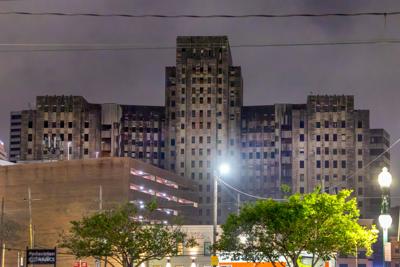When the news spread about the predicted severity of Hurricane Katrina, Ella M. was called into work. She lived in New Orleans working as a nurse at Charity Hospital and they required staff to be on site to oversee hospital operations during the storm.
There was one rule, though — no family allowed. Ella, who asked not to use her last name, and her colleagues hunkered down on the third floor with no way to contact family members. They rationed food and water, kept each other company and prayed for the worst to pass.
Ella’s adult children evacuated, but her husband insisted on staying at home with their dog. The couple had evacuated twice before for hurricanes, and he wanted to ride out the weather.
She didn't hear from him again.
Read more: 'Cajundome City' shares important role Lafayette played in Hurricane Katrina response
"We lived on the first floor," Ella said. "My husband could swim, but he had COPD, so he couldn't really hold his breath. There were days when I would drive up and down the road, and I finally managed to sneak into New Orleans. I snuck into the apartment just to check — I wanted to see if I could find a body. There was no sign of him at all."
Ella's husband's body was found in October 2005.
During those critical days at the hospital, unsure of his whereabouts or well-being, Ella did what she had to do — work. Days passed with no word from her husband.
She awoke in the middle of the night to frantic voices alerting her that water was rising quickly and they needed to seek higher ground. Colleagues broke the news — the entire city was flooded, and conditions outside were rapidly worsening.
Read more: From Katrina to the LSU football field to Tulane University: Brandon Surtain followed his heart
Helicopters dropped supplies for evacuees as food stored in the hospital basement was swept away by floodwater. She and her colleagues heard yelling and gunshots from the nearby Superdome.
After five days of fear and uncertainty, the Cajun Navy, a volunteer-based organization helping natural disaster victims, came to the rescue.
“Katrina is when the Cajun Navy first got started,” Ella said. “They put us on boats and took us to an area around Poydras Street. They loaded us up on buses and my bus went to Houston.”
She stayed in a Houston hotel room for a week before her boss notified her she’d be relocated to Lafayette for work. After transferring to Ochsner University Hospital in Lafayette, Ella never moved away.
Read more: This poetry collection by Louisiana writers, artists remember Katrina and Rita: 'It feeds the soul'
Although Ella migrated to Lafayette because of work, she ultimately stayed for the community, culture and people.
“I had friends in New Orleans but not like in Lafayette,” Ella said. “Lafayette has given me a home. I’m just comfortable here. Looking back on the 20th anniversary is bittersweet, but I know I’m where God wanted me to be.”

